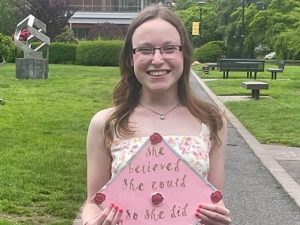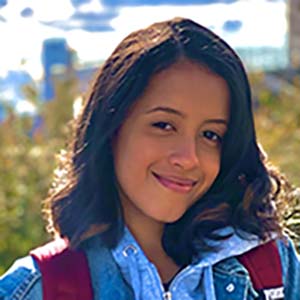
Sophie Breslow ‘24, now an MSW candidate, credits the Learning Resource Program for her successful college experience and preparing her to support other neurodivergent students navigating their own college journeys.

A college support program dedicated to helping students with language-based learning disabilities and/or ADHD achieve their academic and personal goals.
Learn about the criteria for eligibility and requirements to apply to the Learning Resource Program.

Meet with our directors to gain insight and ask questions. Find out about structured support, specific services, and the application process.
Students choose this structured support program for the unique implementation of educational and counseling services that embraces and values the diversity of their strengths and learning styles.
We work with students to enhance self-advocacy skills, providing an important link with supportive faculty and staff across campus. Students participating in the program enroll in credit-bearing courses and complete degree requirements as required by the university.
Continued enrollment in the Program is determined by the student and their Learning Specialist on an annual basis.
The Learning Support Program is a fee-based program. Student fees are for the Learning Resource Program services only. Students may request specific and appropriate accommodations (e.g. testing, note-taking, scribes, assistive technology etc.) by contacting The Student Access Office.
Attending college was what I wanted to do for a very long time, especially being the first person in my family to do this. I was always motivated to learn and enjoyed school, even though it was hard for me. Coming to Adelphi and the Learning Resource Program was one of the best choices I have made, because with the help of my educator I was able to succeed academically.
 Arianna Vega
Junior, BSW, Class of 2023
Arianna Vega
Junior, BSW, Class of 2023
Learning disabilities are generally invisible disabilities. While students may have a diagnosis of an auditory processing disorder, dyslexia, dyscalculia, dysgraphia, a language processing disorder, a non-verbal learning disability, or ADHD, no two students are alike. For some students, the difference in the way they perceive and process information can create gaps in communication, attention, organization and/or planning. Often students have had special education services before college and/or specialized tutors to assist them. They may have an IEP or 504 accommodations. Most students report looking for a college that provides a structured and supportive program, where they can focus on their strengths and be valued for their gifts and contribution to the diverse campus community.

Sophie Breslow ‘24, now an MSW candidate, credits the Learning Resource Program for her successful college experience and preparing her to support other neurodivergent students navigating their own college journeys.